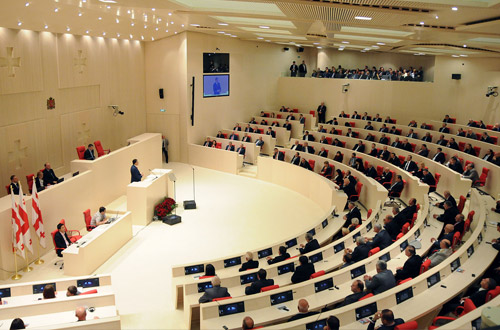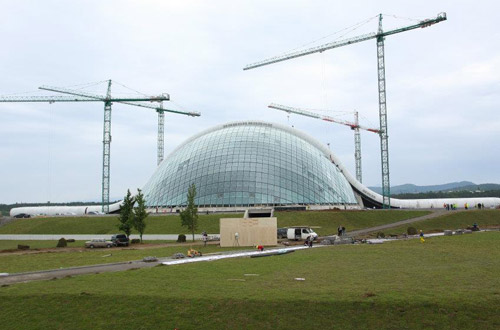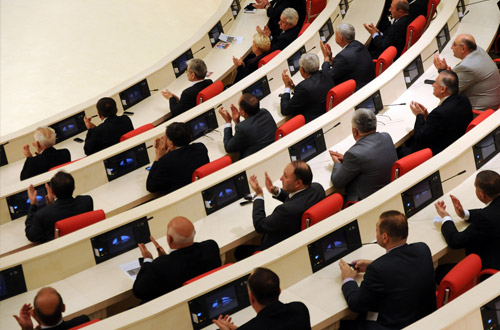| Saakashvili's Independence Day Speech from New Parliament Building |
| Civil Georgia, Tbilisi / 26 May.'12 / 23:54 |
- ‘Like new Parliament building, new Georgia is still unfinished construction’;
- ‘It is important to make the October parliamentary election the fairest, freest’;
- ‘Some are preparing for using the elections to derail Georgia’;
- ‘I am sure our people will stand firmly as never before to save democracy’;
- Parliament relocation to Kutaisi part of ‘de-centralization’ process;
- De-centralization helps creation of many centers across the country;
- ‘Emergence of many centers is the firmest foundation for country’s unity’;
- ‘Accountability of local self-governance before the people should increase’

President Saakashvili addresses lawmakers, government members and foreign diplomats in the new parliamentary chamber in Kutaisi on May 26. Photo: InterPressNews.
In his speech on the Independence Day President Saakashvili spoke of “de-centralization” in the context of Parliament’s planned relocation to Kutaisi, need for holding “the fairest and freest” parliamentary elections in October and made couple of allusions to Bidzina Ivanishvili and his opposition coalition calling them “dark forces of the past”.
The speech was made from the rostrum of the new Parliament building in Kutaisi.
Construction of the 40-meter high glass-dome building with its 200-meter long thin shell concrete structure, covering the dome like a stripe, was worth at least GEL 133.7 million (about USD 82.5 million), which is up to 2% of the country’s total budget expenditures set for this year. 46-meter high concrete and bronze World War II memorial was blown up to make way for construction of the new Parliament building in December, 2009 during which a woman and her child died.
Although its façade and parliament session hall were prepared to hold the first sitting of the Parliament on May 26, the construction of other parts of the building is expected to be fully completed by October. The sitting Parliament will continue working in its current building in Tbilisi and the new building in Kutaisi will become a permanent residence for the Parliament, which will be elected in the October elections.
Saakashvili entered into the new Parliament chamber holding a hard hat in his hand and before taking floor to make a speech he went to a seat occupied by MP Giorgi Targamadze, the leader of Christian-Democratic Movement (CDM), and gave him the hard hat in what appeared to be a response to CDM’s earlier warnings not to hold the session in an unfinished new Parliament building for safety reasons. Lawmakers from CDM were not initially going to participate in a symbolic parliamentary sitting in the new chamber, but later revised their decision and they were present in Kutaisi. Lawmakers from opposition parliamentary faction Unity for Justice did not participate.
“Of course water will leak [from the roof] and of course wind may rip off part of the roof. Of course it will happen; such things can always happen when you build a new building. But we are being criticized for that by those people who have been destroying everything for past fifteen years and those who still want to throw [the country] into the past; I won’t accept this criticism from these people,” Saakashvili said in his speech.
He compared unfinished building of the Parliament to “new Georgia”, which he said was still a work in progress.
“This is a new building, like our country is; new Georgia is still unfinished construction,” Saakashvili said, adding that although much has been done “building of new Georgia is still far from being over.”

The 40-meter high glass-dome building of the Parliament with its 200-meter long thin shell concrete structure, covering the dome like a stripe, seen on this photo dated with May 25, 2012.
He said the major challenge was to make Georgia’s progress accessible for each and every household.
“Of course, Georgia is an unfinished building in terms of democracy building,” he said. “Because of that it is important to make the October parliamentary election the fairest, freest and exemplary with its highest degree of democracy.”
“Of course, there are people, who are preparing not for the elections, but for using the elections to derail the country from the road of development, for ensuring that the next [NATO] summit does not become an enlargement summit for Georgia. Of course, they have received such instruction - we know it very well – and they are working on that.”
“We know that Georgia’s neighbor has scheduled large scale military exercises in parallel to our elections and will try to create a pretext in order… to undertake actions during our elections for achieving its desired goal to overthrow the Georgian government. We know everything. We know that such plans do exist; we know that there is inflow of money [from Russia]; we know that everything is being done for that purpose,” he said.
“I am sure that our people will stand [firmly] as never before to save democracy and future,” he continued. “We know that it is impossible to bring the country’s success to the society if people’s democratic rights are not protected under the highest standards. Only free people manage to get rid of unemployment and poverty.”
He said that de-centralization was an important part of this policy. Relocation of Parliament from Tbilisi to Kutaisi is described by the authorities as part of their “de-centralization” efforts, although opponents say the move would further weaken the legislative body.
De-centralization, Saakashvili said, also meant giving more powers to the local self-governance bodies. Saakashvili said that this trend had already been underway, including through introducing direct election of Tbilisi mayor two years ago. The capital is the only city in the country where mayor is directly elected.
“I offer you to continue moving towards further democratization and de-centralization with bold steps… Local self-governance bodies should get closer to the people and their accountability before the people should be increased,” he said without elaborating details of the proposal.
He said de-centralization process was more than just “eliminating division between peripheries and the center”, it was about carrying out “citizen-centered” policies.
“I want everyone in Georgia to feel that the place where they live is the center,” Saakashvili said.
He said relocation of Parliament and de-centralization process in general also aimed at fostering “Abkhazia and Abkhazians to restore contacts with our homeland.”
“That’s one of the major motivations of Parliament’s relocation. David the Builder [Georgian King in 1089-1125] started Georgia’s reunification from Kutaisi,” Saakashvili said.
“Emergence of many centers is the firmest foundation for unity,” he said.
He also said that relocation of the Parliament to Kutaisi amounted “to return of power” in the hands of the people and putting an end to division of Georgia into eastern and western parts.
In this context he mentioned myth about Prometheus and then said: “Now it is time for a new political Prometheism to ensure that political power never remains in the hands of a small group of one and the same people – the group, which publicly announces that non-rich people have nothing to do in politics.”

Lawmakers applaud as President Saakashvili's speech in the new parliamentary chamber in Kutaisi on May 26. Photo: InterPressNews.
Saakashvili is often making such remarks about “non-rich in politics” after one of the representatives of Ivanishvili’s party said in February that only those who have “a proper material environment” should go into politics.
“The dark forces of the past, whatever money they are armed with, whatever lies they are telling, whatever dreams they may have about demolishing a bridge and suspending new constructions, they will not be able to stop Georgian people’s accelerated drive towards progress, equal distribution of power and responsibility, unity, West and Europe,” said Saakashvili, again referring to Ivanishvili, who said recently that he would like to remove a glass roof pedestrian Bridge of Peace over Mtkvari river in the old part of Tbilisi and replace it with a new one. Later Ivanishvili said that in case of coming into power he would ask Tbilisites what kind of bridge, if any, they would like to have in place of the existing one.
Saakashvili said those times when Georgia was perceived by various empires as “a periphery” had gone.
“Georgia will not be anyone’s periphery anymore and still existing fifth column with its psychology of a slave will not be able to throw Georgia [into the past] to lick somebody’s boots. Those people, who think that Georgian people started the [August, 2008] war… and those, who think that the only way to save Georgia is to lick the invader’s boots, will never be able to return Georgia into the status of being a humiliated country,” Saakashvili said.
After the speech, Saakashvili reviewed a military parade held outside the new Parliament building in Kutaisi. It was the first time when the Independence Day military parade was held outside Tbilisi.
Meanwhile in Tbilisi the Independence Day was marked by “industrial parade” on the Rustaveli Avenue, involving putting on public display Georgian-made products ranging from agriculture, food and textile products to railway carriages and armored vehicles.
Round up of some reactions on social media on Independence Day events in Tbilisi and Kutaisi available on Storify.
Last year’s Independence Day celebrations were marred as hours before the military parade on the Rustaveli Avenue in Tbilisi anti-government protest rally was broken up by the riot police. One policeman and three protesters died. According to official version none of the deaths were caused by the riot police actions. The death of a policeman and one protester has been attributed to a car crash when a motorcade, taking several protest leaders, away from the protest scene, drove into the crowd and the death of two other protesters was caused by electrocution on a roof of a shop, close to the protest venue.
Bidzina Ivanishvili, the leader of Georgian Dream opposition coalition attended on Saturday a church service in the Holy Trinity Cathedral in Tbilisi commemorating those who died on May 26 last year. Nino Burjanadze, ex-parliamentary chairman who led last year’s protest rally disappeared by the riot police, was also present at the service.
